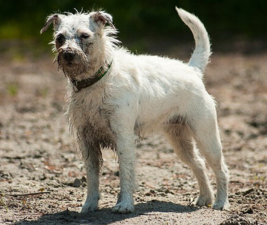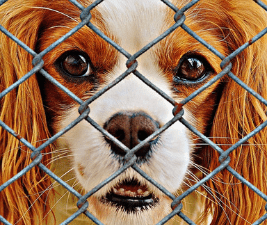We got a surprise last week. Our blog post was about rescue dogs and it said there’s always a reason dogs are in a shelter or rescue situation. We didn’t say it’s the dog’s fault. We did say the reasons for rescue are either medical (people can’t afford care), physical (people can’t take care of the dog), or behavioral (people don’t or won’t train the dog). It is always, every single time, some human’s failure in some capacity, that lands a dog in the hands of a rescue.
And yet – we were slammed for being anti-dog, a shill for breeders, and all-around terrible people. Because we pointed out that every single rescue dog is going to come with some baggage. And that not every rescue dog is just a puddle of love waiting for a container to hold it. Some dogs are projects, not pets. And not every family can, or should, take on those kinds of projects.
Let’s get real

Dogs are not pure, perfect beings. That’s an unrealistic view. It reminds us of the philosophy of Rousseau and the idea that man, by nature, was pure and good, and society was the corrupting influence.
And it’s silly. Dogs, like people, are selfish, egocentric, complex beings who are capable of wonderful and awful behavior. When people say ridiculous things like “all dogs are good, altruistic, honorable souls,” they’re telling us they don’t really know anything about dogs. Dogs can be jerks. We know dogs are dirty, disgusting, and rude. They’re also capable of unconditional love, altruism, partnership, and caring. To acknowledge one without the other means you don’t really know dogs. You know and love the idea, not the reality.
If everyone had a dog
When we hear people say that the world would be a better place if everyone had a dog, we shudder. Not everyone has the time, patience, or capacity to love the way dogs deserve. In our training classes we tell people they have to spend 15 minutes a day playing training games with their dogs. And if they don’t have 15 minutes a day, every day, to devote to their dog, they shouldn’t have one.
If you really love dogs, you have to see all the nasty bits as well as the wonderful parts. Is it fun to carry a poop bag around? Not really. It’s also not a barrel of laughs to do laundry at two in the morning because you woke up to your best friend retching on your sheets. But you do it because you really love dogs. And you understand that love is accepting them for what they are, instead of looking at them through rose-colored glasses.
Dogs are perpetual juveniles who depend on us. It’s a big responsibility that not everyone can, or should, take on. A family of mature empty-nesters may want to take on a project and save a dog’s life. They may have the time and resources to devote to lighten that dog’s load. The young family with a constant revolving door of friends and relatives may not be able to do it. It’s not fair to the dog or the people.
The reason for rescue
We’ve been supporting local shelters and rescues for many years. Rarely does a dog arrive in rescue with a full, truthful story. People lie about why dogs are surrendered. Whether to assuage their own guilt, or paint a prettier picture for themselves, they lie. And, if you adopt a shelter or rescue dog, you’ll have to accept that you’ll never, ever know what really happened to your dog before. You only get to treat the symptoms, because you’ll never know the cause.
It can be done. We’ve done it. But even the people chastising us proved our point – telling us how wonderful their rescue dogs turned out, because the people were “up to the challenge” those dogs presented.
We’re not saying don’t get a rescue dog. By all means, if it’s right for you, go for it. But everyone should know that life with a rescue dog isn’t all peaches and cream, rainbows and roses, hugs and cuddles. It may take some time for that rescue dog to accept a hug. Or want to snuggle on the couch. Will it be worth the wait? Lots of us think so. But it’s for every individual to decide for themselves.
Enjoyed this post? Click here to sign up for the weekly newsletter and never miss another!









